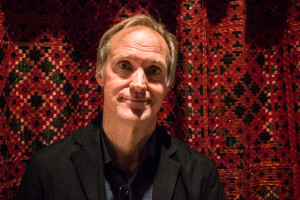Tags
Related Posts
Share This
The Poet’s Guide to Journalism
On Oct. 14, Tom Sleigh, a noted poet, read excerpts from his most recent collection of poems — “Station Zed” — to a crowded O’Shaughnessy Performance Space at Santa Fe University of Art and Design. The collection is part of a new body of work by Sleigh inspired by his recent travels to the Middle East.
In addition to the poems, Sleigh journalized the experience in an essay titled “The Deeds” in which Sleigh casts himself as a poet in journalist’s clothing, seeking passage to the Lebanese city of Qana in order to learn the Palestinian side of the 2006 Israeli-Palestinian conflict.
“I loved doing it,” Sleigh says, “I didn’t think about myself…all doubts immediately vanished… [and] there was no detail too small that wasn’t suddenly charged with interest.”
“The Deeds” was published in the Virginia Quarterly Review in 2008, and selected for inclusion in the 2009 edition of the “Best American Travel Writing” compendium. However, before this acclaim Sleigh says he had no desire to go to Lebanon — adding, as a joke, that he barely knew where to find it on a globe.
“What I didn’t know about Lebanon could fill many books.”
In 2007, Munir Akash invited Sleigh to Lebanon. Akash is the founder of the Trans-Arab Unity Foundation, and Sleigh’s invite was part of an initiative by the group to bring artists and writers to the Middle East. Sleigh says Akash wanted him to assess and write about the conditions of Palestinian refugees, “particularly in the aftermath of the 2006 war.”
Originally, the trip was postponed for three months, Sleigh says, because of backlash from the murder of “a very prominent Christian Maronite politician” — Plerre Gemayel.
According to the trans-Arab news network Al-Jazeera, the cabinet minister was gunned down in his car during a traffic jam in a Christian neighborhood — almost immediately his death was followed with “angry protests” by his supporters.
Though unsettling for Sleigh, an assassination turned out to be the least of his worries.
“As soon as we landed,” he says, “a huge car bomb went off.”
In Lebanon, Sleigh says car bombs are so frequent that while watching Abbott and Costello’s “Meet the Mummy” in a Beirut hotel room, he saw commercials for personal bomb-detecting devices — an experience upon which he elaborates in “The Deeds.”
During his visit, the violence only escalated. Sleigh says he experienced some of the worst internal violence since the 15 years of civil war that took place in Lebanon between 1975 and 1990.
“People were being blown up all the time…and I was scared.”
In spite of his fear, or maybe as a result of it, Sleigh became “acutely aware” of the world around him, and was “totally interested in what everybody was wearing, what they were thinking [and] what they were saying.” The experience, at times, was even “exhilarating.”
Because most of the fighting in 2006 had occurred in the southern part of Lebanon, Sleigh says he decided to go there to see what, if anything, had been preserved.
“But did I know what the hell I was doing?” Sleigh asks, adding, “no.”
Never before had Sleigh attempted journalism.
Sleigh met Chris Merrill — another poet whom he describes as an “old-school journalist who covered the Bosnian war.”
Merrill showed Sleigh the journalistic ropes, and through technical mimesis Sleigh acquired the information-gathering skills that would be required of him to complete “The Deeds.”
“It was monkey see, monkey do,” he says, but “poetry taught me how to compress information, and to describe accurately what I see.”
In gathering information for his essay, Sleigh says he “did lots of interviews,” and not once throughout the process did he use a tape recorder, which he believes acts as a barrier between the journalist and the subject when the two are attempting to establish trust. Also, a subject — in the absence of a tape recorder — is more likely to be forthcoming with information that is either personal, or essential to the story — or both.
“You’re the invisible one writing the great one’s words down,” Sleigh says, and “After awhile they’ll tell you anything. And they’d never do that with a tape recorder.”
Though Sleigh’s experience in Lebanon has become indispensible to him and his subsequent work, the same cannot be said for the discipline of journalism.
“I’m not a policy wonk,” he says, “I write long-form essays. I don’t have the difficulty of making a living by being a journalist [and] I don’t want to be that. I want to remain an amateur.”
Sleigh has written two other essays on the subject of the Middle East, and plans on writing more.
In spite of his travels to war-torn countries, Sleigh says the most profound thing that’s ever happened to him, in terms of his writing, was learning the time when he’s at his most productive.
“I realized the best energy I had during the day was in the morning, so I took jobs that allowed me to use that energy. That was it.”







 Jackalope Magazine is the student magazine of Santa Fe University of Art and Design. Building on the interdisciplinary nature of our education, we aim to showcase the talent of our university and character of our city.
Jackalope Magazine is the student magazine of Santa Fe University of Art and Design. Building on the interdisciplinary nature of our education, we aim to showcase the talent of our university and character of our city.
Recent Comments